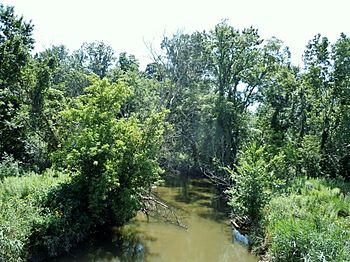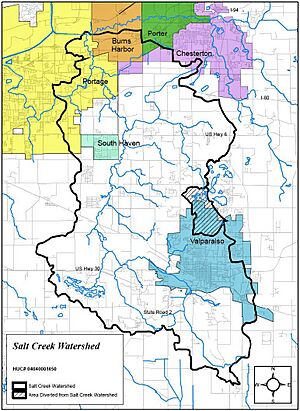Salt Creek (Little Calumet River tributary) facts for kids
Quick facts for kids Salt Creek |
|
|---|---|

Salt Creek looking upstream from Route 6 Bridge, just east of SR 149, near South Haven, Indiana.
|
|
| Other name(s) | Little Salt Creek |
| Country | United States |
| State | Indiana |
| Region | Porter County |
| Cities | Burns Harbor, Portage, South Haven, Valparaiso |
| Physical characteristics | |
| Main source | Porter County, Indiana, United States 720 ft (220 m) 41°25′21″N 087°01′27″W / 41.42250°N 87.02417°W |
| River mouth | East Arm Little Calumet River Burns Harbor, Porter County, Indiana 591 ft (180 m) 41°36′41″N 087°09′01″W / 41.61139°N 87.15028°W |
| Basin features | |
| Tributaries |
|
Salt Creek is a 24-mile (38.6 km) long river in Porter County, Indiana. It starts south of Valparaiso and flows north. The creek joins the East Arm Little Calumet River just before it reaches Lake Michigan. It connects to Lake Michigan through the Port of Indiana-Burns Waterway.
Contents
History of Salt Creek
Long ago, Salt Creek was much wider and deeper. Old maps from the 1800s show large areas of water that are now dry land. People even thought about using boats to carry grain and wood down Salt Creek to Chicago. This would have been done by connecting to the Calumet River.
Important Indian trails once crossed the Salt Creek area. The "Pottawatomie Trail" was a main path from the Wabash River to Lake Michigan. In Porter County, this trail followed a ridge between Coffee Creek and Salt Creek. It ended right at the beach.
Salt Creek's Path and Area
The Salt Creek watershed covers about 19% of Porter County. A watershed is an area of land where all the water drains into a single river or creek. This watershed includes towns like Valparaiso, South Haven, Portage, and Burns Harbor, Indiana.
The creek starts in an area called the Valparaiso Moraine. This is a curved ridge of hills that runs along the southern shore of Lake Michigan. The moraine acts like a natural divider. Water north of the moraine flows into Lake Michigan. Water south of it flows towards the Kankakee River.
Amazing Animals and Plants
The Salt Creek area is home to many special plants and animals. At Samuelson Fen in Imagination Glen Park, scientists have found over 200 types of plants. Most of these plants are native to the area. Some are even "threatened species," meaning they might become endangered soon. These include the great Saint John’s-wort and the smaller forget-me-not.
More than 400 kinds of insects live here too! Some rare butterflies, like the Baltimore checkerspot and sedge skipper, call this place home.
Even some animals that were once rare in Indiana have been seen here. The American badger and bobcat were once on Indiana's endangered list. But their numbers have grown, and they are now protected as animals that cannot be hunted.
Beavers and Their Homes
Beavers were once hunted so much that they disappeared from Indiana by 1900. But in 1935, beavers from Wisconsin and Michigan were brought back. This was a big success! Beavers were seen in the Indiana Dunes National Lakeshore by 1968.
Beavers are like nature's engineers. They build dams that create wetlands. These wetlands are super helpful! They clean the water by removing dirt and bad stuff. They also create great homes for fish like coho salmon. Beaver ponds help young fish grow and provide safe places for them in winter. Most beaver dams do not stop fish from moving up and down the creek, except sometimes when the water is very low.
Keeping Salt Creek Clean
Parts of Salt Creek are now protected by Indiana Dunes National Park. This helps keep the area natural and healthy.
A group called Save the Dunes is also working to protect the creek. They received a grant to improve a water basin near Valparaiso. This basin helps control floodwaters. By adding wetland plants, it will also filter out pollution, dirt, and bacteria before the water flows into the creek and eventually Lake Michigan. This project helps both wildlife and water quality.
Fun Activities at Salt Creek
Salt Creek is a popular spot for fishing! The Indiana Department of Natural Resources adds fish to the creek. These include steelhead trout, Chinook salmon, and coho salmon. These fish come from Lake Michigan and swim up the creek. Even though Indiana's creeks are a bit too warm for these fish to have many babies naturally, the regular stocking means there are always fish to catch!
 | Emma Amos |
 | Edward Mitchell Bannister |
 | Larry D. Alexander |
 | Ernie Barnes |


